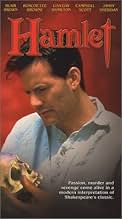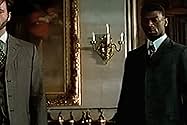Aggiungi una trama nella tua linguaThe classic Shakespeare tragedy is revisioned in America at the turn of the 20th Century. Campbell Scott (Singles, The Spanish Prisoner) adapted, co-directed and stars in the title role with... Leggi tuttoThe classic Shakespeare tragedy is revisioned in America at the turn of the 20th Century. Campbell Scott (Singles, The Spanish Prisoner) adapted, co-directed and stars in the title role with Tony Award winner Blair Brown (Copenhagen) as his mother Gertrude.The classic Shakespeare tragedy is revisioned in America at the turn of the 20th Century. Campbell Scott (Singles, The Spanish Prisoner) adapted, co-directed and stars in the title role with Tony Award winner Blair Brown (Copenhagen) as his mother Gertrude.
- Regia
- Sceneggiatura
- Star
Recensioni in evidenza
There is something in the way that Campbell Scott saids his lines that makes me totally understand what Hamlet is feeling. Often times, I don't understand everything that Hamlet saids, but this time, I understood practically everything!
The rest of the cast is very good, especially Blair Brown who plays the queen.
I've watched this movie two times because I was fascinated by Campbell Scott's great performance. This was one of the few movie rentals that I've enjoyed in a long time.
Anyone who likes Shakespeare's work will love this version.
The popularization of Freudian psychoanalysis has made it very easy to read Hamlet as neurotic; and very easy, too, to read his relationship with his mother as "Oedipal" fixation. Consequently, some readings of Hamlet have the whole play revolve around the question of whether Hamlet is mad, or just neurotic (and with good reason to be upset at his Step-dad).
All this should only remind us that Freudianism is a terrible trivialization of human personality.
If the reader really needs a one-sentence reduction of Hamlet it is this: Both Hamlet's father and his uncle-stepfather are barbarian bullies from Hell, and Hamlet is trying very hard not to be.
Notice that Mom of Denmark doesn't really show up in this equation. Nor does the avoidance of Hell seem to be an overly neurotic concern (certainly not for an Elizabethan).
Scott gives us a 20th century post-Freudian Hamlet. Of course the complex morality of the piece gets entirely lost.
Everybody here tries hard, but it's just not convincing.
Among the few reservations (to the film, not to Campbell)is that the film lets the ghost interfere with Hamlet's assassination in the prayer scene. I believe the abortive murder here is entirely due to Hamlet's invalid subterfuge - his father would prefer to have his brother bumped off whenever. I don't think Ophelia should be present when Hamlet is exposed as her father's murderer.
However, two things make up for this in full: that we have a blood-soaked Hamlet making jokes about Polonius' death (which displays Hamlet as the self-absorbed brat Shakespeare intended him to be), and we expose Hamlet's final betrayal of his father when he signs the entire kingdom off to Norway (the ghost appears also in the final scene, looking very dismayed). Hamlet never avenges his father, not in Shakespeare, a fact that has been overlooked for 400 years, but this version suggests it.
But the best feature of the film is Scott's performance. I don't think anyone can take Hamlet, or Shakespeare for that matter, further in the direction of naturalistic acting. All stilted pronunciation and over-articulated syllables that we are frequently served are banished from this production; Scott could have spoken his lines on a bus, and no fellow passengers would suspect that they were Shakespeare. Scott's fast.talking, neurotic and endearingly gawky Dane is the best Hamlet I ever saw.
Lo sapevi?
- ConnessioniVersion of Le duel d'Hamlet (1900)

































